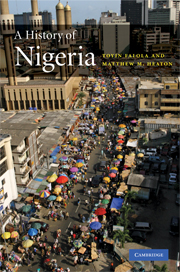Book contents
- Frontmatter
- Contents
- List of illustrations
- List of maps
- Acknowledgments
- Chronology
- Notable people in Nigerian history
- List of abbreviations
- Glossary
- Map 1 Major cities and ethnic groups in present-day Nigeria
- Introduction
- 1 Early states and societies, 9000 BCE – 1500 CE
- 2 Slavery, state, and society, c. 1500 – c. 1800
- 3 Political and economic transformations in the nineteenth century
- 4 Transition to British colonial rule, 1850 – 1903
- 5 Colonial society to 1929
- 6 Nationalist movements and independence, 1929 – 1960
- 7 Instability and civil war, 1960 – 1970
- 8 Oil, state, and society, 1970 – 1983
- 9 Civil society and democratic transition, 1984 – 2007
- 10 Nigeria and Nigerians in world history
- Concluding remarks: corruption, anti-corruption, and the 2007 elections
- Notes
- Selected bibliography
- Index
3 - Political and economic transformations in the nineteenth century
Published online by Cambridge University Press: 05 June 2012
- Frontmatter
- Contents
- List of illustrations
- List of maps
- Acknowledgments
- Chronology
- Notable people in Nigerian history
- List of abbreviations
- Glossary
- Map 1 Major cities and ethnic groups in present-day Nigeria
- Introduction
- 1 Early states and societies, 9000 BCE – 1500 CE
- 2 Slavery, state, and society, c. 1500 – c. 1800
- 3 Political and economic transformations in the nineteenth century
- 4 Transition to British colonial rule, 1850 – 1903
- 5 Colonial society to 1929
- 6 Nationalist movements and independence, 1929 – 1960
- 7 Instability and civil war, 1960 – 1970
- 8 Oil, state, and society, 1970 – 1983
- 9 Civil society and democratic transition, 1984 – 2007
- 10 Nigeria and Nigerians in world history
- Concluding remarks: corruption, anti-corruption, and the 2007 elections
- Notes
- Selected bibliography
- Index
Summary
INTRODUCTION
The nineteenth century brought great changes to the states in the Nigerian region. Although social formations within the various geographical regions remained diverse, several relatively large, centralized states came to dominate geopolitical and economic dynamics during this time period. In the northern savanna zones, the Islamic jihad of Usman dan Fodio led to the establishment of the Sokoto Caliphate, an expansive state that brought under one government all the Hausa states, as well as some former provinces of Borno and lands that had once been under the control of Oyo and the Jukun states, in the south and southeast respectively. Although dan Fodio and his successors were never able to implement the ideal Islamic state that they sought to build, they had nevertheless reconfigured the political and cultural landscape of the northern savanna towards a primary identification with Islam by the time British colonial forces sacked Sokoto in 1903.
In the southern region of the greater Nigerian area, political and economic transformations occurred as well. In the southwest, the empire of Oyo fell in the early nineteenth century, ushering in an age of intraregional warfare as new Yoruba states fought for dominance over the areas that had previously been stabilized by the rule of the alafin. Simultaneously, the British abolition of the slave trade in 1807 led to an overt attempt to redirect trade away from human cargo and towards items of “legitimate” commerce.
- Type
- Chapter
- Information
- A History of Nigeria , pp. 61 - 84Publisher: Cambridge University PressPrint publication year: 2008



